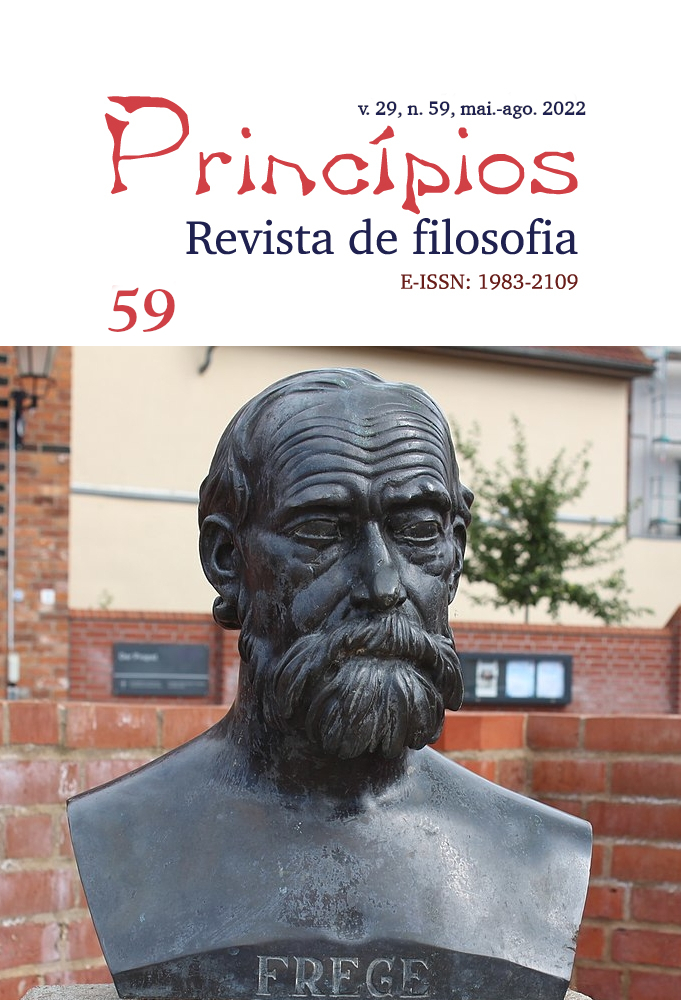Meaning, Colouring, and Logic: Kaplan vs. Frege on Pejoratives
DOI:
https://doi.org/10.21680/1983-2109.2022v29n59ID29589Palavras-chave:
Colouring, Pejoratives, Validity, Frege's dictum, Kaplanian inferencesResumo
Although Frege’s aim was not to provide a semantic theory for a natural language, he made, to say the least, valuable and enduring contributions to semantic theory, understood as the assignment of semantic values, and possibly, further meaning properties to natural language expressions. His arguing, notably in Frege (1892), for the assignment to any well-formed linguistic expression of a sense (Sinn), in addition to its reference (Bedeutung) — if any—, is one — and, arguably, the most celebrated and disputed among his contributions.
Downloads
Referências
AUXIER, R.E.; HAHN, L. E. (eds.). The Philosophy of Michael Dummett. Chicago, La Salle, ILL.: Open Court, 2007.
BACH, K. Loaded Words: On the Semantics and Pragmatics of Slurs. In: D. SOSA (ed.) (2018), pp. 60-76.
COSENZA, G. (ed.) Paul Grice’s Heritage. Turnhout: Brepols, 2001.
CURRIE, G. Remarks on Frege's Conception of Inference. Notre Dame Journal of Formal Logic, 28 (1), pp. 55-68, 1987.
DI FRANCO, R. Pejorative Language. Internet Encyclopedia of Philosophy, 2014.
DUMMETT, M. Frege: Philosophy of Language. Cambridge, MA: Harvard University Press, 1981.
FREGE, G. Über Begriff und Gegenstand. Vierteljahrsschrift für wissenschaftliche Philosophie, 16 (2), 1892a.
FREGE, G. Über Sinn und Bedeutung. Zeitschrift für Philosophie und philosophische Kritik, 100 (1), pp. 25-50, 1892b.
FREGE, G. Logik. In: H. HERMEL; KAMBARTEL, F.; KAULBACH, F. (Hrsg.) (1969), pp. 137-63, 1897.
FREGE, G. Einleitung in die Logik. In: H. HERMEL; KAMBARTEL, F.; KAULBACH, F. (Hrsg.) (1969), pp. 201-12, 1906a.
FREGE, G. Kurze Übersicht meiner logischen Lehren. In: H. HERMEL; KAMBARTEL, F.; KAULBACH, F. (Hrsg.) (1969), pp. 213-18, 1906b.
FREGE, G. Brief an Husserl. In: GABRIEL, G.; H. HERMES, H., F. KAMBARTEL, C. THIEL; A. VERAART (Hrsg.) (1976), pp. 101-6, 1906c.
FREGE, G. Der Gedanke. Eine logische Untersuchung. Beiträge zur Philosophie des deutschen Idealismus, 2, pp. 58-77, 1918-19.
FREGE, G. Nachgelassene Schriften. H. HERMEL; KAMBARTEL, F.; KAULBACH, F. (Hrsg.). Hamburg: Felix Meiner, 1969.
FREGE, G. Posthumous Writings. HERMES, H.; F. KAMBARTEL; F. KAULBACH (eds.). Oxford: Blackwell, 1979.
FREGE, G. Wissenschaftlicher Briefwechsel. GABRIEL, G. ; H. HERMES, H., F. KAMBARTEL, C. THIEL; A. VERAART (Hrsg.). Hamburg: Felix Meiner, 1976.
GUTZMANN, D. Expressives and Beyond: An Introduction to Varieties of Use-Conditional Meaning. In: GUTZMANN; H.-M. GÄRTNER (eds.) (2013), pp. 1-58.
GUTZMANN, D. The Grammar of Expressivity. Oxford: Oxford University Press, 2019.
GUTZMANN, D.; GÄRTNER, H.-M (Eds.). Beyond Expressives: Explorations in Use-Conditional Meaning. Leiden: Brill, 2013.
HAY, R. Hybrid Expressivism and the Analogy Between Pejoratives and Moral Language. European Journal of Philosophy, 21 (3), p. 450-474, 2013.
HOM, C. Pejoratives. Philosophy Compass, 5 (2), pp. 164-185, 2010.
HORN, L. R. Towards a Fregean Pragmatics: Voraussetzung, Nebengedanke, Andeutung. In: I. KECSKES; L. R. HORN (Eds.) (2007), pp. 39-69.
HORN, L. R. I Love Me Some Datives: Expressive Meaning, Free Datives, and F-Implicature. In: D. GUTZMANN; H.-M. GÄRTNER (eds.) (2013), pp. 143-189.
KAPLAN, D. The Meaning of ‘Ouch’ and ‘Oops’: Explorations in the Theory of Meaning as Use. Cornell Conference on Context Dependency, pp. 1-29, 1999.
KAPLAN, D. The Meaning of ‘Ouch’ and ‘Oops’. Howison Lecture in Philosophy delivered at UC Berkeley. Transcribed by E. Coppock, 2004.
KARTTUNEN, L. Presuppositions of Compound Sentences. Linguistic Inquiry, 4 (2), pp. 169-193, 1973.
KECSKES, I; HORN, L. R. (Eds.) Explorations in Pragmatics: Linguistic, Cognitive, and Intercultural Aspects. Berlin, New York: De Gruyter, 2007.
KORTUM, R. Varieties of Tone: Frege, Dummett, and the Shades of Meaning. London: Palgrave Macmillan, 2013.
NEALE, S. Coloring and Composition. In: KURASUGI, K.; R. STAINTON (eds.) (1999), pp. 35-82.
KNEALE, S. Implicature and coloring. In: G. Cosenza (ed.) (2001), pp. 135-180.
KURASUGI, K.; STAINTON, R. (eds.). Philosophy and Linguistics. London, New York: Routledge, 1999.
ORLANDO, E.; SAAB, A. (eds.). Slurs and Expressivity: Semantics and Beyond. Lanham, MA: Lexington Books, 2020.
PICARDI, E. Colouring, Multiple Propositions, and Assertoric Content. Grazer Philosophische Studien, 72 (1), pp. 49-71, 2006.
PICARDI, E. On Sense, Tone, and Accompanying Thoughts. In: R. E. AUXIER; HAHN, L. E. (eds.) (2007), pp. 491-520.
POTTS, C. The Expressive Dimension. Theoretical Linguistics, 33 (2), pp. 165-198, 2007.
SANDER, T. Two Misconstruals of Frege's Theory of Colouring. The Philosophical Quarterly, 69 (275), pp. 374-92, 2019.
SANDER, T. Fregean Side-Thoughts. Australian Journal of Philosophy, 99(3), pp. 455-71, 2021.
SANDER, T. Taxonomizing Non-At-Issue Contents. Grazer Philosophische Studien, forthcoming.
SAUERLAND, U. Beyond Unpluggability. Theoretical Linguistics, 33 (2), pp. 231-6, 2007.
SOSA, D. (ed.). Bad Words: Philosophical Perspectives on Slurs. Oxford: Oxford University Press, 2018.
SOUTIF, L.; MÁRQUEZ, C. Expressives and the Theory of Bias. In: ORLANDO, E.; A. SAAB (eds.) (2020), pp. 95-116.
VALTONEN P. Semantic Innocence and Kaplanian Inferences. Sats, 20 (1), pp. 19-33, 2019.
Downloads
Publicado
Como Citar
Edição
Seção
Licença
Copyright (c) 2022 Ludovic Soutif

Este trabalho está licenciado sob uma licença Creative Commons Attribution-NonCommercial-ShareAlike 4.0 International License.
Autores mantêm os direitos autorais e concedem à revista o direito de primeira publicação, com o trabalho simultaneamente licenciado sob a Licença Creative Commons Attribution que permite o compartilhamento do trabalho com reconhecimento da autoria e publicação inicial nesta revista.
Termos da licença:
| Não Comercial (NC) | Os licenciados podem copiar, distribuir, exibir e executar a obra e fazer trabalhos derivados dela, desde que sejam para fins não comerciais. |
| Compartilha Igual (SA) | Os licenciados devem distribuir obras derivadas somente sob uma licença idêntica à que governa a obra original ou menos restritiva. |


 Português (Brasil)
Português (Brasil) English
English Español (España)
Español (España) Français (Canada)
Français (Canada)


